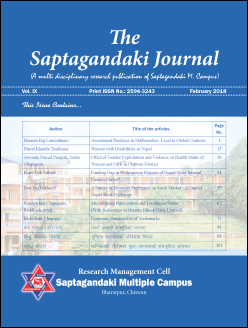Assessment Practices in Mathematics: Local to Global Contexts
DOI:
https://doi.org/10.3126/sj.v9i0.20876Keywords:
Mathematics assessment, Post/positivist perspective, Integral perspective, Assessment of learning, Assessment for learning, Assessment as learningAbstract
The main purpose of this paper is to explore the present mathematics assessment practices in local and global contexts. For this, I decisively review educational policies, practices, curricular documents and contemporary researches. In doing so, I select the Finland, China, USA, as they have stood in the significant positions in an international comparative study such as TIMSS, PISA and Nepal. It reveals that the assessment practices in mathematics are not an isolated phenomenon that have been executed by an external authority at the end of the academic sessions to quantify the individual attributes relating to mathematical performances. It is largely embedded in educational activities from the very beginning and simultaneously works throughout the programme for enriching mathematical outcomes and performances of students. I capture two major trends of assessment practices of these countries; post-positivist approaches of assessment and integral approaches of assessment. The post/positivist perspective incorporates summative evaluation techniques and assessment of learning whereas integral perspectives concentrate on assessment for learning as having broad goals of reconstructing, reframing and transforming the entire programs. These trends of assessment practice largely blend with philosophy of mathematics education. The comparing and contrasting views of assessment practices would be helpful for the policy makers, educators, mathematicians and other related personnel for critically re-evaluate their respective assessment practices and thus encourage to transform the deep-rooted conventional assessment practice that is one of the major hindrance to sanction the mathematics education within the positivistic paradigm.
The Sapta Gandaki Journal
Vol. IX, 2018 Feb. Page: 1-16
Downloads
Downloads
Published
How to Cite
Issue
Section
License
© The Saptagandaki Journal
The author of article must sign the copyright permission or the author must assign copyright to the Journal/to the Campus Authority prior to publication.
All rights reserved.




